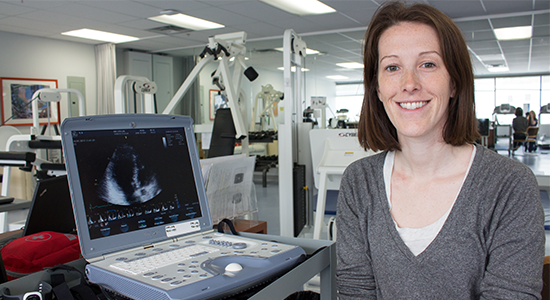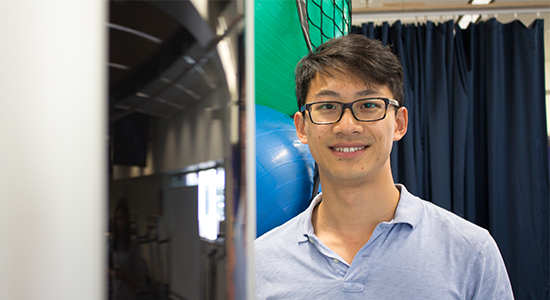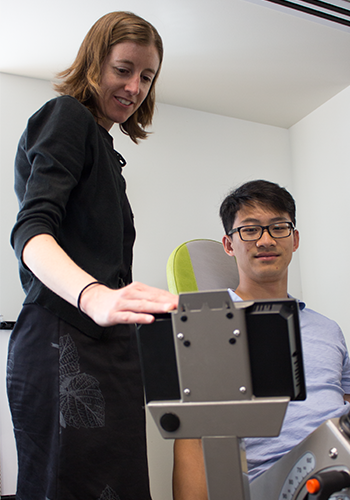What role does exercise play in cancer prevention, rehabilitation, and survivorship?
Rehabilitation Science students – Amy Kirkham, and Stanley Hung – are on the path to find out.
Working alongside UBC’s Dr. Kristin Campbell, an Associate Professor in the Department of Physical Therapy, these students are involved in diverse and innovative research exploring just how important physical activity is when it comes to preventing cancer, and improving the lives of those battling the disease.
We sat down with each of them to find out more about their research, what keeps them motivated and what’s in store for them next.
Amy Kirkham
PhD Candidate, UBC Rehabilitation Sciences Graduate Program

Tell me about your research.
Women who have had breast cancer are more likely to die of cardiovascular diseases than women who have not had breast cancer. This may be due – in part – to the deleterious effects of chemotherapy on the cardiovascular system.
My dissertation research aims to test the hypothesis that aerobic exercise can protect the heart from chemotherapy treatment-related toxicity. Over 30 animal studies have shown that aerobic exercise is cardio-protective against a common class of chemotherapeutic agents used to treat many cancer types called anthracyclines. My research will be among the first to try to translate these findings from animals to human breast cancer patients.
What’s involved with the research?
I am currently collecting data for two different projects related to exercise cardio-protection from anthracycline-related cardiotoxicity in breast cancer patients. I receive patient referrals from Medical Oncologists at the BC Cancer Agency, and call the potential participants to screen them for eligibility and interest in participation over the phone.
Between the two studies, data collection can consist of venipuncture and blood processing, resting echocardiogram (i.e. heart ultrasound), maximal exercise test, plus some questionnaires. I also supervised exercise training sessions at our research facility used only for breast cancer research. Outside of the data collection, I have to manage, organize, and analyze my data and timing of follow-up data collection visits. I am also working on a number of other projects outside of my thesis that involve writing papers, applying for ethics, managing staff and volunteers to assist with data collection, entry and acquisition.
Why is this research important?
My research is investigating the role of an inexpensive and easily accessible therapy (exercise) in mitigating a severe and dose-limiting side effect of anthracycline chemotherapy treatment. This has implications for cardiovascular disease-related mortality, but also breast cancer related mortality in breast cancer survivors. It is estimated that one percent of the Canadian population are survivors of breast cancer. I hope that my research will play a role in impacting the health of these women.
What keeps you motivated?
Working with women diagnosed with breast cancer on a weekly basis. I am really grateful for the ability to regularly experience, first hand, the benefit my research makes in cancer survivor’s lives. I also love discovering new aspects of physiology during chemotherapy and exploring data. I love what I do so it’s not hard to find motivation.
What are your plans for the future?
Next, I will be doing my postdoc at the University of Alberta, where I will utilize the gold standard for cardiac imaging (cardiac magnetic resonance imaging) to characterize the effects of cancer treatment on the heart, vasculature, and skeletal muscle with the hopes of uncovering some of the mechanisms of cancer treatment-related cardiotoxicity. I will also use this technology to further my PhD research by providing highly accurate, quantitative evidence of the benefits of exercise and nutrition intervention during cancer treatments.
After that I hope to secure an Assistant Professor position at a research-intensive institution.
Stanley Hung
MSc Graduate, UBC Rehabilitation Sciences Graduate Program
MPT Candidate (2015), UBC Master of Physical Therapy Program

Tell me about your research.
More and more people are surviving their cancer diagnosis, and there is a growing focus on addressing the side effects of cancer treatment, such as surgery and chemotherapy, which are well documented to have toxic or debilitating effects on a cancer survivor’s quality of life.
During my MSc in Rehabilitation Sciences, I was part of a larger research team investigating the role of exercise and physical activity in cancer prevention, rehabilitation, and survivorship. For my thesis, I investigated the factors associated with physical activity levels in children who completed treatment for leukemia, who tend to be less active and more obese compared with children who do not have a cancer diagnosis.
What’s involved with the research?
Cancer is a multi-disciplinary field. For my thesis, I had the opportunity to collaborate with many healthcare professionals, such as physiotherapists, physicians, nurses, and many others. Understanding the goals of each discipline is an integral part of our research to ensure all aspects of patient care and recovery are properly recognized.
We also interact with cancer patients on a regular basis by supervising their physical activity/exercise sessions, or doing data collection/testing sessions with them for the studies. During my thesis, I also had the opportunity to meet the parents and children of families who have been touched by cancer. Aside from doing physical function testing with the children, it was great to speak with the parents who also share the same enthusiasm for cancer rehabilitation and research.
Why is this research important?
The researchers in this area of research are constantly investigating new ways to improve the supportive care provided to cancer patients.
Childhood cancer survivors are at higher risk of obesity, among other side-effects of treatment. Understanding how we can help them become more active can potentially address the obesity issue, as well as promote a healthier lifestyle after their treatment.
In general, exercise and physical activity is recognized as a way to prevent cancer, shown to be beneficial for patients during and after treatment, and is also recognized to help prevent cancer recurrence and overall mortality for cancer survivors. Yet,

exercise is not part of the standard care, and more work is needed to demonstrate the feasibility of incorporating cancer rehabiliation into the current medical system. Our hope is to disseminate our findings as an example for how public medical systems can include exercise as part of cancer supportive care not only within Canada, but across the world!
What keeps you motivated?
Helping people is my main motivation. Although the innovation and complexity of the research question and challenges are very interesting, knowing that our work will ultimately contribute towards improving the lives of cancer patients and survivors is the key motivation to my work.
The leaders in our field, including Dr. Campbell, are an inspiration for demonstrating how passion, leadership, and hard work can make a huge impact on people’s lives. One day, I hope to be one of those leaders.
What are your plans for the future?
I’ll be starting a Master of Physical Therapy at UBC in September 2015.
Down the road, I hope to use the skills I’ve learned during my MSc and MPT to further improve the quality of life for cancer patients using exercise and physical activity as my main vehicle of advocacy. My goal is to work closely with cancer patients as a clinician researcher, so I can help directly inform research and practice within the public setting.